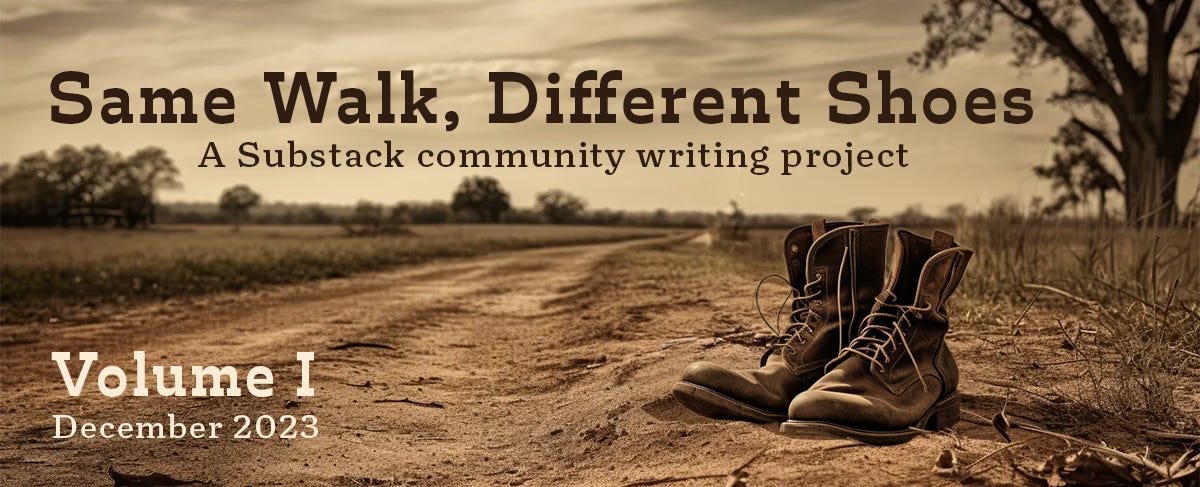“Same Walk, Different Shoes” is a community writing project that Ben Wakeman organized as a practical exercise in empathy. The premise is simple. A group of writers anonymously contribute a personal story of an experience that changed their life. Each participating writer is randomly assigned one of these story prompts to turn into a short story. The story you are about to read is one from this collection. You can find all the stories from the participating writers at Catch & Release. Enjoy the walk with us.
Into Me I See
Imagine a colorful, multi-textured world of nature, crayons, and music as your window to another land, the land your parents moved to before you were born, carrying kaleidoscopic pieces of home with them. The sounds of Cantonese1 and celebrations of Chinese New Year danced with the suburban yard I inhabited and the imaginative world I created at the kitchen table while my mom cooked sweet and sour pork or steamed fish with ginger. On dumpling nights, the table became our sculpting table. I learned how to make the dough, fill each section with just enough pork and scallion mixture, and pinch the ends together. My mom would correct me kindly if I did it wrong. Most of this happened in a comfortable silence with dissonant American radio music playing in the background. When I knew the words, I sang along to my mother’s delight. She gazed at me with pride and awe.
When my dad came home from work, tired, he would grab a beer from the fridge and say, “I’m hungry. What’s for dinner?” before asking us how we were. Then, before an answer, he would go on with some kind of short anecdote from his day, “That idiot at work asked me why China was taking so much of our business.” We knew he erupted into the house like this because the love was ever-present and sometimes, despite his age and position as the bread winner, he just needed to be listened to. Now that I’m grown up, I know we still feel like children a lot of the time.
“Is that a problem? Aren’t they?”
“Yeah, but he asked it personally. He thinks I’m Chinese. And then, Frank was there, too, and well he is Chinese as you know. So, Frank says that he’s working for an American company, so what’s the big deal.”
“Right, makes sense.” My face was ping-ponging between them, trying to understand.
“But then, then! Then…he says to both of us that maybe we are spies and going to share the patents we’re working on with them. Frank has refugee status. What the hell? It’s crazy.”2
“Who is this guy? Is he your boss?”
“No, but he was speaking loudly so others could hear. He laughed at the end and said I take things too seriously. Do I? I don’t always understand American jokes. Frank said to just leave it.”
“Who knows? Just keep your head down, I guess. The dumplings and rice are ready. Why don’t you two sit down and I’ll finish the bok choy while you get started.” She cooked the greens and garlic in the wok with a deft flick of the wrist synchronized with the beats of Cantopop coming from a tape player.
Despite these frequent episodes, my father said he loved his job and it paid for our house so that was enough. In fact, I knew he had a lot of friends at work, too. Even the “idiot” liked him, respected his opinion. He came to our house for dinner once. They just had no idea what it was like.
Each of my parents was struggling in their own way: my mom in isolation in the house and my dad in constant invisible conflicts at work. But they were optimistic and pretended everything was fine. My mother said she loved being able to live how she wanted without constant flows of people meddling with her – in her invisibility she was free, she said.
My mom only spoke Cantonese. Well, that’s not true. She had told me she knew some English, but she was too shy to speak it in public. “I have standards!” she said. So instead, she was usually silent when we left the house. I spoke for her, through her, and I think this made us even closer. We shared the same voice.
I must have known it couldn’t last forever, though.
One day, my mom told me she would have to go away for several months, and it was like all the walls of the fort I had built that morning under our Eastern red-cedar tree enclave had blown apart. My protection was gone, that warmth I knew I would always come home to after a day at school of going through the motions the teachers asked us to complete. After a hug and a snack, I would run back into our yard to play. I gathered pinecones and sticks to make designs under the tree in the fort my parents had helped me create. I climbed the branches and jumped like a squirrel. I felt free and happy. There weren’t many other kids in the neighborhood, so I enjoyed this time by myself after what felt like a long school day. Breathing freely within the constraints of our little diasporic oasis.
Mom spoke to me in Cantonese as she always did: “Agnes, I’ve got to go be with Grandma in Hong Kong. She’s sick. It’s too much for her amah3; she really needs family.”
“What about Aunt Jane? Can’t she help?”
“Sweetie, Aunt Jane just had a baby. Really, she could use some help as well. I want to go, want to help. But I’ll miss you! Come here.” She hid her tears behind our hug. “You are a strong girl. Daddy will come home from work a bit earlier and get you at after-school. I’ve already spoken to the principal about it. Ok?”
I nodded silently. There was no other choice.
⬩
My life had been a linear, enveloping cloud until that point. I had been at peace because I hadn’t stopped to consider who I was. I guess that’s a part of growing up. The fish realizes it’s in water. But the role models in front of me confused me. My parents, the ones who had kept me safely in a shell had allowed me to drown in my mother tongue, blissfully unaware of its existence. It was just the way we were.
Going to school all day was one thing, but interacting in the chaotic after school activities was another. There were groups of friends who either split off to play particular games when we went outside or corralled around a particular table when we did arts and crafts. The helpers weren’t really teachers. They just let us get on with it unless there was a problem. Then, they’d blow a whistle.
I tended to go off and do something by myself. It was easier. Occasionally the helpers would organize kickball or read a story. At these times, we were all equal again. There were no divisions amongst us, and I could remain student #23. The fourth smallest in line and last alphabetically. The quiet girl who could climb like a monkey.
This kid named Ethan asked me one afternoon why I was all alone. “Why don’t you have friends? What do you like to do?”
I was silent. I felt exposed for my lacking. Who was I?
“Agnes, you must be into something. What? What do you like to do?”
His friends ran over and started poking him and teasing, “Ohh you like her” and “She’s a loner, let’s go.”
Ethan left without looking back. I asked if I could go inside to the art room and the helper agreed. I felt like the colors inside me were all muddled, that I had to somehow put them on paper, or they would implode. I wasn’t sure they were worth an iteration. Was I just a lump of a child, moving through the motions every day without worth? Whom did I matter to besides my parents anyway?
Then and there, I created something. It started out as a child missing her mother. I drew her with an aching heart, knowing we would talk on the phone that Friday as we had for two months already.
In that image, she was happy. She was holding out her arms to welcome me home after school. I had faith those days would return. But what about the rest of the picture? I didn’t want to return to her like some abstract rainbow and be absorbed by her love. Instead, I wanted to show her who I was.
I drew parts of our life at home first – the food, the music, the cedar trees, wooden blocks, the TV, my room. And I then drew me at school. I loved when we had gymnastics in PE or got to climb the rope to the ceiling. I was the only girl who could do it. I felt alive when we talked about animals and science in class. A lady had come to show us the inside of owl pellets. I wanted to ask my mom if I could go on the nighttime owl viewing trip with her and a few other kids. I realized maybe Dad would go with me. I drew a picture of Martin Luther King4 whom we had learned about a few weeks ago. I thought his speech was beautiful and had decided I wanted to do something brave like him when I was older.
Looking back at that picture in my box of childhood things, I can see all the pieces, but it just looks like a bunch of swirling colors and lines. Somehow, I knew it at the time, too. I wanted to write it out. I wanted to write what was in my mind, who I was becoming.
And then I had an idea: I would write it as a letter to my mom. I didn’t have to wait until she came home. The phone calls were always short; she asked a lot about school and what we were eating. She didn’t want to talk about grandma, because now I know she was dying at the time. She always said the call was expensive as a way not to talk about it.
I ran into the car when my dad picked me up. “I want to write Mom a letter!” I announced.
“Oh, that’s nice, she’ll appreciate it.”
He didn’t understand the intention, but I left that silent. He thought I was thinking of her, when I really wanted to understand myself. It made me feel guilty. And then more shame set in: “Dad? I’m not sure I can do all the characters. I only know a few. Can you help me with them?”
“I can, of course, Agnes. But you know, your mom would also understand it in English. Up to you.”
“But she will only understand some of the words then…”
My dad was laughing, “Sorry, I shouldn’t laugh! It’s just, well, she’s been, um, tricking you.”
“What?” One of the only two people who really cared about me had lied to me?
“Don’t be angry. No, Mom insisted on speaking only Cantonese with you and even pretending that she couldn’t speak English. She wanted to make sure that you would learn. She’s afraid of losing our Hong Kong culture. Mom went to The University of Hong Kong when she studied psychology. All her courses were in English.”
I was dumbfounded, completely unable to speak. Dad laughed again. “Stop laughing at me!”
“Sorry! Sorry. I’m not. I’m laughing at your mother. You know she can be so stubborn sometimes. I told her this was quite unnecessary. So, do you want to write that letter in English or with traditional Chinese characters?”
We had just pulled into the driveway. Bright green grass in need of mowing and an Easter bunny door decoration I had made at school greeted us, waiting quietly for my reply. It wasn’t like this in Hong Kong. I knew because I had been for a short trip two years before. I didn’t know which place I liked better. I just knew they were different. “English. I’m going to tell her I know what you just told me. Ok?”
“Sure, it’s about time I think.”
When we got inside the warm house, shielded from the crisp New England spring, he found stationery and pens, which he placed on the kitchen table. He began making pizza from scratch. The dough reminded me of my mom’s dumplings, but I was too busy writing to help. Occasionally, he let out a little chuckle, even a rolling giggle. I smiled, put my head down, and wrote my first letter.
⬩
For the three months that followed, while my grandma was slowly dying in Hong Kong, my mom and I exchanged countless letters. I didn’t always wait for a reply. I just kept writing, weaving ideas and anecdotes, fears and dreams, sketching pictures and adding occasional Cantonese.
A lot of the things I wrote about felt like paradoxes: How could I enjoy drawing but do better in math at school? How could I be shy and have strong ideas about America? Why did I sometimes hate my big shoulders even though they helped me to climb to the top of the gym? I asked my mom these things rhetorically, although occasionally she had an answer. Once, I asked her why she didn’t work if she had studied so hard at school.
I really wanted to make sure you were ok. I wanted to spend more time with you. What do you think if I go back to work? I was thinking I might when I return. Virginia down the road said her practice needs a part time psychologist. I could start that way. Tell me what you think. 我鍾意你5
I was shocked my mom was asking me what she should do. I showed my dad.
“Why don’t you just tell her to do whatever would make her happy?” I agreed. I wrote it to her in Cantonese with my dad’s help.
Each day, I started to feel more alive. It was difficult sometimes, facing the world. I wasn’t always playing under the cedar trees anymore. Occasionally, I returned. I even brought a new friend named Thomas who lived nearby. He was also really into our American history lessons and climbing the ropes at school. I showed him how to leap between branches and we made pinecone art together. We started to invite other kids in the neighborhood to see it. Sometimes they liked it, and other times the laughed at us and ran away.
Everything was changing. I had a new relationship with my mom in her absence and at the same time got to spend so much more time with my dad. I had told him how much I liked Martin Luther King when he saw the picture I took home that day, so he told me he would take me to a political speech. It was a senator at a rally in Boston. We sat up high in the rafters after passing through security. I was amazed and inspired by the optimistic visions, the emotion from the anaphora and body language, and the reflection of hope in the crowd. That was the seed that made me want to be a political scientist.
But I was still alone after writing these letters and attending this rally. In fact, I was more alone than before. Because I had found something else: peaceful solitude. In writing, I could discover who I was and feel loved before encountering anybody else, their judgments or invitations. I was no longer in a cocoon – that space that could have remained a prison had I not found out who I was. I had found love…for myself.
Postscript
I’ve been an immigrant elsewhere for seventeen years, so I imagined being an immigrant in my home country – the USA - when I received my prompt. I grew up in a town with many immigrants, and many of them from East Asia. These were my friends, and I think it’s a large part of why I was interested in moving to Hong Kong for so long (eight years). I tried to invert the immigrant experience I had in HK but using a HK family in my story. I hope none of it comes across as cliched. A lot of immigrant stories deal with or refer to language, food, and family/school conflicts. This story comes from my experiences as well as those of my friends and a bit of research as a response to the great prompt I received.
I also want to recommend a collection of short stories I’ve used with many students called Growing Up Ethnic in America. I especially love the Gary Soto and Amy Tan stories in there.
It has been truly rewarding to attempt to step into someone else’s shoes, and I want to thank
for the opportunity to participate in this great project. I’ve already asked him permission to steal this idea to use with my students next year!To the anonymous writer of my prompt: Thank you for sharing your story! I apologize if you had something else in mind but hope that this explored some of the ideas through an empathetic lens. Your prompt was poetic!
All readers: I’d love to hear your thoughts in the comments. Thank you. And please do check out the rest of the collection on Ben’s site when you have time.
Happy New Year!
You can hear the sounds of Cantonese here. My friend Jacqui reads PK Leung’s poetry (not in the actual podcast, but the embedded recordings in the post):
Some recent research from Harvard on the discrimination Asian people face in the American workplace.
In Hong Kong, an amah is a helper, which can be a combination of maid/cook/nanny and general ‘helper’ in the household. I recommend taking a look at this beautiful film by Ann Hui about one such helper who needs the help of her adopted family in old age: A Simple Life. Additionally, a colleague and friend of mine in Hong Kong has done a lot of research about Filipino helpers as well as translating poetry and novels about the practice or written by helpers from Tagalog to English. Carlos Piocos now works in his home - The Philippines.
My favorite text by Martin Luther King, jr., is Letter from a Birmingham Jail. You can also pause your day to watch the original I Have a Dream speech here.
Cantonese for I love you. Pronounced: Ngor zung yi lei / In Cantonese, the more casual and playful way of saying I love you has the connotation of food. In Hong Kong, one often first asks if you have eaten when you meet up.










Beautifully done, Kate. I love the dimension and warmth you brought to this piece working from a prompt probably didn't give you any big dramatic scene. No one died (directly), lost a child or divorced. It was a subtle transformation and you handled it with such thought and care.
I loved the relationships in this story. You conveyed the security and trust between mother and daughter beautifully, and also the confidence of the two parents in each other. I utterly enjoy the company of this family. 💕